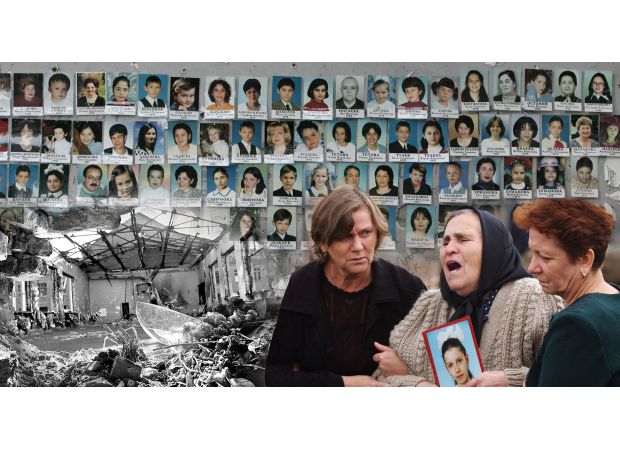It has been two decades since the Beslan attack, but it seems that Russia has not learned any lessons from the tragic event.
Russian state caused suffering & destruction on citizens without consequences.

It's been twenty years since the haunting events that have stayed with Vladimir Putin, the President of Russia. It's not his past as a KGB agent or the mysterious deaths that seem to follow those who oppose him. It's the tragedy that took place in Beslan, Russia, where 334 innocent civilians, including 186 children, lost their lives in a hostage situation caused by Chechen and Ingush rebels.
The rescue mission that followed was chaotic and disregarded the lives of innocent civilians as the Russian security forces used excessive force to eliminate the terrorists. However, it wasn't just the terrorists who lost their lives that day. Many hostages, both men, women, and children, also perished, while others were left with life-long injuries.
Even after two decades, the families of the victims have not forgotten the tragedy and continue to seek justice from a government that they believe was involved in the deaths of their loved ones. They feel that the government was complicit in the inadequate handling of the rescue operation, which resulted in the loss of many innocent lives.
On the morning of September 1, 2004, it was supposed to be a day of celebration for the students of School Number One in Beslan, Russia. Little did they know that their first day of school would turn into a nightmare as armed terrorists stormed the school and took over 1,100 people hostage, including children, parents, and other family members.
Journalist Simon Ostrovsky, who was working for the Moscow Times at the time, traveled to Beslan to report on the situation. He recalls the tension in the town as everyone had a personal connection to someone inside the school. On the third day of the siege, the Russian security forces accidentally detonated explosives inside the school, causing chaos and confusion.
The rescue operation was chaotic, causing the death of 186 children and many other civilians. For Simon, it was his first direct experience with how Russia deals with crisis situations. He was shocked to see the lack of care and disregard for civilian lives during the rescue mission.
At the time, Putin was criticized for not publicly visiting the site of the tragedy. He declared a two-day period of mourning and admitted that they showed weakness in handling the situation. However, it took Putin two decades to visit Beslan officially, where he met with the parents of the survivors. In his speech, he focused on defeating neo-Nazis in other regions instead of addressing the tragedy that occurred in Beslan.
The tragedy at School Number One has left a deep wound in the small Russian town. Almost all the terrorists were killed in the siege, and the lone survivor, Nurpashi Kulayev, was sentenced to life in prison. However, there are still unanswered questions about the execution of the rescue mission and whether the security services had prior knowledge of potential attacks.
In 2017, the European Court of Human Rights ruled that Russia failed to protect the hostages, contributing to the high death toll. However, Russia responded by rejecting the ruling and maintaining that they did everything possible to handle the situation. Witnesses and survivors of the siege have also accused the Russian security forces of using excessive force and heavy weapons, resulting in civilian casualties.
Unfortunately, this response from Russia is not uncommon, according to Simon. He explains that it set the pattern for Putin's behavior over the past two decades, where civilian lives are disregarded in the pursuit of defeating enemies. The tragic events at School Number One are a reminder of this pattern.
The Kremlin's internal politics could have played a role in the inadequate handling of the hostage situation. Simon believes that there is an incentive to pass good news up the chain of command, leading to the neglect of potential threats like the one in Beslan.
This pattern of behavior is evident in other terrorist attacks in Russia, such as the Crocus City Hall attack in Moscow, where more than 145 people lost their lives. It was later revealed that Russia had been warned about a potential terrorist attack but did not take action. Instead, they hunt down the perpetrators and use videos of torture as a means of retaliation.
Keir Giles from the think tank Chatham House believes that these incidents show how the Russian government prioritizes their own interests over the protection of civilian lives. He warns that if Putin is not met with a meaningful deterrent, these tragedies will continue to occur. As long as Putin is in power, there will never be peace in the world.






